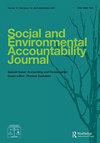Corporate reporting metamorphosis: empirical findings from state-owned enterprises
Q2 Business, Management and Accounting
Social and Environmental Accountability Journal
Pub Date : 2021-04-17
DOI:10.1080/0969160X.2021.1914842
引用次数: 4
Abstract
Nicolo and colleagues examine the level of compliance and the factors determining such compliance in the context of integrated reporting by state-owned enterprises (SOEs) in Europe. The study uses content analysis and an ordinary least square regression of integrated reports issued in 2016 by 34 SOEs representing 12 European countries. The content analysis was undertaken by developing a binary non-weighted disclosure index. The index was developed by assigning a score of one for every item on the Integrated Reporting Framework (IRF) disclosed by each firm under study, whereas a score of zero for the absence. The IRF is not mandatory but it is one of the reporting frameworks suggested by Directive 2014/95/EU which imposes the SOEs under study to report their non-financial issues. Despite being voluntary, the authors use the term ‘compliance’ with the framework to constitute the disclosed items on the IRF. The content analysis reveals that the firms under study fairly complied with the IRF requirements. Meanwhile, the regression analysis shows that firm size and sensitive industries were positively associated with the level of compliance, but the length of the report was negatively associated with the compliance level. A closer look at the compliance measurement suggests that the more items on the IRF were disclosed in the report, the higher the degree of compliance. However, this compliance potentially reflects ‘box-ticking’ behaviour, seeking legitimacy by symbolically meeting the IRF requirements without substantively showing social and environmental improvements in the area where the firms operated. Such symbolic behaviour may potentially also exist in mandatory settings under the Directive 2014/95/EU, where the ‘normativity of the law’ determines how influential the mandatory reporting requirements are, and therefore how likely they are to be complied with. In this regard, compliance with the mandatory reporting requirements of Directive 2014/95/EU is intimately entwined with the perception of reporters as to whether the requirements are binding. The normativity of the law in this context implies that SOEs may decouple the disclosure of items on the IRF from the actual practice when the mandatory reporting requirements of the Directive 2014/95/EU are perceived contradictive with their organisational objectives. Future research can explore reporters’ perceptions of the normativity of the mandatory reporting requirements through interviews and then link these perceptions to a longitudinal study of disclosure level in integrated reports. Such a study, rather than a cross-sectional one, can facilitate the examination of corporate reporting ‘metamorphosis’ over time. The interviews, along with the longitudinal study, can also explore whether disclosures in the integrated reports under study capture the actual practice – confirming whether this is symbolic or substantive compliance.企业报告蜕变:来自国有企业的实证研究
Nicolo及其同事研究了欧洲国有企业(SOEs)在综合报告背景下的合规水平和决定此类合规的因素。该研究对代表12个欧洲国家的34家国有企业2016年发布的综合报告进行了内容分析和普通最小二乘回归。内容分析是通过开发一个二元非加权披露指数进行的。该指数是通过为被研究的每家公司披露的综合报告框架(IRF)上的每个项目分配1分来开发的,而没有的得分为0分。IRF不是强制性的,但它是2014/95/EU指令建议的报告框架之一,该指令要求正在研究的国有企业报告其非财务问题。尽管是自愿的,但作者使用术语“遵守”框架来构成IRF上的披露项目。内容分析表明,所研究的公司公平地遵守了IRF的要求。同时,回归分析表明,企业规模和敏感行业与合规水平呈正相关,而报告篇幅与合规水平呈负相关。仔细观察合规度量表明,报告中披露的IRF项目越多,合规程度就越高。然而,这种合规性可能反映了“打勾”的行为,通过象征性地满足IRF的要求来寻求合法性,而没有实质性地显示公司经营所在地区的社会和环境改善。根据2014/95/EU号指令,这种象征性行为也可能存在于强制性环境中,其中“法律的规范性”决定了强制性报告要求的影响力,从而决定了遵守这些要求的可能性。在这方面,遵守2014/95/EU指令的强制性报告要求与记者对要求是否具有约束力的看法密切相关。在这种情况下,法律的规范性意味着,当2014/95/EU指令的强制性报告要求被认为与其组织目标相矛盾时,国有企业可能会将IRF项目的披露与实际做法脱钩。未来的研究可以通过访谈探讨记者对强制性报告要求规范性的看法,然后将这些看法与综合报告披露水平的纵向研究联系起来。这样的研究,而不是横断面研究,可以促进对公司报告随时间“蜕变”的研究。访谈以及纵向研究还可以探讨所研究的综合报告中的披露是否符合实际做法-确认这是象征性的还是实质性的合规。
本文章由计算机程序翻译,如有差异,请以英文原文为准。
求助全文
约1分钟内获得全文
求助全文
来源期刊

Social and Environmental Accountability Journal
Business, Management and Accounting-Accounting
CiteScore
3.90
自引率
0.00%
发文量
16
期刊介绍:
Social and Environmental Accountability Journal (SEAJ) is the official Journal of The Centre for Social and Environmental Accounting Research. It is a predominantly refereed Journal committed to the creation of a new academic literature in the broad field of social, environmental and sustainable development accounting, accountability, reporting and auditing. The Journal provides a forum for a wide range of different forms of academic and academic-related communications whose aim is to balance honesty and scholarly rigour with directness, clarity, policy-relevance and novelty. SEAJ welcomes all contributions that fulfil the criteria of the journal, including empirical papers, review papers and essays, manuscripts reporting or proposing engagement, commentaries and polemics, and reviews of articles or books. A key feature of SEAJ is that papers are shorter than the word length typically anticipated in academic journals in the social sciences. A clearer breakdown of the proposed word length for each type of paper in SEAJ can be found here.
 求助内容:
求助内容: 应助结果提醒方式:
应助结果提醒方式:


